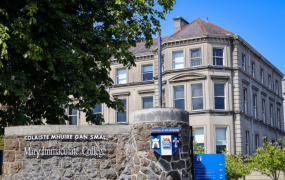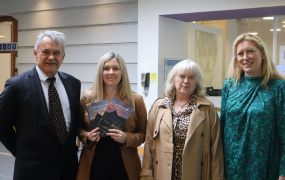Fees & Funding
About
Depending on the type of programme you undertake at Mary Immaculate College, you may be required to pay tuition fees and other charges. There are also various types of funding available through educational schemes, loans or scholarships to help international students.
EU/Non-EU Status Assessments
The designation of a student as being from the EU or a Non-EU country determines the fees they will pay at Mary Immaculate College (MIC) i.e. there may be cases where a non-EU national acquires EEA citizenship during the course of their third level studies and would qualify for the HEA's 'Free Fees' Scheme, for example.
To determine status, EU/Non-EU Status Assessments are conducted in MIC by the International Office.
For an indication of current status, see the EU/ NonEU Fee Assessment Flow Chart or for more details about Eu/ Non EU Status assessments click here.
International (Non-EU) Tuition Fees
Non-EU Fees schedules for undergraduate and postgraduate courses can be found in the Fees section of our website.
If you have questions about your fees, please email: StudentFees@mic.ul.ie
How and When to Pay your Fees?
For information on available fee payment methods and deadlines, please visit the Paying Your Fees section of our website.
All students should familiarise themselves with MIC Fee Regulations. The most up to date MIC Fees Regulations document can be found under How to Pay heading of the Paying Your Fees section.
Fee Payment Requirements for Study Visa
Students applying for a Study Visa are required to pay a portion of their tuition fees prior to making their visa application. This is a requirement of the Department of Justice and is independent from MIC Fees Regulations. The amounts and conditions are set by the Department of Justice and can be found on INIS Study Visa Information page.
MIC will provide students with the Letter of Acceptance and will confirm when the fees have been paid.
Federal Aid
Consumer Information about Federal Aid & Related Loans
US Federal Student Aid Loans
The MIC International Office administers US Federal Student Aid Loans to eligible students from the USA studying at Mary Immaculate College.
US Federal Student Aid programmes available for eligible MIC students
US Citizens and eligible non-citizens can apply for the following Federal Student Aid programmes
- Subsidized Direct Loans - available to undergraduate students
- Unsubsidized Direct Loans - available to undergraduate and graduate students
- Graduate / Parent PLUS Loans - available to graduate and parents of eligible undergraduate students
As a foreign school MIC is not certified for PELL Grants, TEACH Grants or FSA Work Study programmes and students are not able to avail of this type of financial aid while studying at MIC.
For more information on loan types, loan limits and interest rates click on US Federal Student Aid Loan options .
For more information on loan limits and interest rates click here.
Eligibility and Application Process for US Federal Aid Loans
Student Eligibility Requirements
US Citizens and eligible non-citizens enrolled on eligible programmes at MIC at least half-time are eligible to apply for US Federal Student Aid loans. Only residential programmes are Title IV eligible. Non-degree programmes are not Title IV eligible.
Programmes, listed below that are Title IV eligible are from our full Degree, Master's and Doctoral programmes listings and do not include all programmes offered at MIC. Please check this list carefully to ensure your chosen course is eligible for US Federal Aid.
Bachelor of Science in Psychology
Bachelor of Arts (Liberal Arts)
BA in English Language and Literature
MA in Applied Linguistics (face-to-face version of this programme only is US Federal Aid eligible)
Master of Arts in Media Studies
The following programmes are available on our Thurles Campus only:
BA in Education, Business Studies & Accounting
BA in Education, Business Studies & Religious Studies
BA in Education, Mathematics & Business Studies
BA in Education, Home Economics & Business Studies
Please read Mary Immaculate College International Student Admissions Policy before submitting a loan application. Please note that students who enter through the Mature Student entry route do not qualify for US Federal Student Aid.
Application Process
To apply for a Direct or Direct PLUS loan at Mary Immaculate College, you must file a free application for Federal Student Aid (FAFSA) here.
On your FAFSA you must enter:-
- School name: Mary Immaculate College
- US Dept of Education (DOE) School Code:042412
If you are applying for the first time, you will need to create a username and password. This will enable you to access your information quickly on subsequent visits to the FAFSA site. It will also enable you to complete a Renewal FAFSA in future years. You may have to return to the site to enter or update information on your (or your parents, in the case of dependent undergraduates) tax returns etc.
This process generates your FAFSA Submission Summary which includes your Student Aid Index (SAI). This is required by the school to determine your eligibility to receive a Federal Loan and also the amount you are eligible to borrow.
Information about current MIC degree programmes available to international students can be found by following the links below. Please note: the programmes that are Title IV eligible only are listed under the section above: Eligibility and Application Process.
You can find more information about the faculty personnel and facilities under the respective faculty web pages:
Students in receipt of US Financial Aid can only go on Erasmus/International Exchange to another institution that is eligible to administer US Financial Aid. Students in receipt of US Federal Aid who are interested in partaking in Erasmus/International Exchange must notify the Financial Aid administrator at MIC in advance to identify the eligible institutions that students may attend.
Students in receipt of US Financial Aid cannot go on International Exchange or do Co-Op/Internship placement in the USA.
The regulations under Regulation § 600.52 are as follows:
a foreign institution may not permit students to enroll in any course offered by the foreign institution that takes place in the United States, including research, work, internship, externship, or special studies. Despite this prohibition, independent research done by an individual student in the United States for not more than one academic year is permissible if it is conducted during the dissertation phase of a doctoral program under the guidance of faculty and the research can only be performed in the United States. (Additional guidance on the Title IV program ineligibility of foreign institution programs offered in the U.S. can be found in Dear Colleague Letter GEN-11-18.) Under §600.54(c), an eligible foreign institution may not enter into an arrangement under which a Title IV-ineligible entity provides any portion of the eligible institution’s programs (except for affiliation agreements for the provision of clinical training for foreign medical, veterinary, and nursing schools).
Cost of Attendance information can be viewed by clicking on this link and see the heading under Cost of Living.
The Default Management Plan adopted by MIC is available here.
Distance Education programmes at Mary Immaculate College are not eligible for US Federal Aid loans.
The regulations under § 600.51 section (d) outlines that a program offered by a foreign school may not include any use of a telecommunications course (distance education), correspondence course, or direct assessment, except that telecommunication technologies may be used to supplement and support instruction that is offered in a classroom located in the foreign country where the students and instructor are physically present.
Entrance Counselling: US Federal Regulations require that all students who borrow Direct Loans, for the first time, undergo Entrance Counselling. It is most important that you understand your rights and responsibilities when borrowing Federal Student Loans.
You can complete your Entrance Counselling on the Federal Aid website here.
When you complete the online Entrance Counselling, please send a confirmation email to the school.
Exit Counselling: You are required to undergo Exit Counselling during your final year, before you graduate. Also, if you withdraw from the college, or drop below half-time attendance, you are required by law to have Exit Counselling, beforehand.
You can complete your Exit Counselling on the Federal Aid website here.
When you complete the online Exit Counselling, please send a confirmation email to the school.
The grace period, whether here or in the US, always starts when the student is no longer enrolled at least half time. Once students cease academic activity, they are considered as the equivalent of "Graduated" regardless of the date of parade on stage. In the case of US Federal loans for Postgraduate Students the date of submission of their thesis is the end of their academic activity so their grace period begins from then and not after the conferring ceremony the following January. Undergraduate students are reported as graduated once the spring semester results are released in mid-June.
The FSA Direct Loan Disbursements are made at the start of each semester after the student is fully registered for the semester’s modules and commenced attendance.
When authorised by the student, financial aid will be disbursed to student fees due for that semester within 3 days from MIC receiving the funds from the US Department of Education and the balance, if any will be disbursed by Electronic Funds Transfer (EFT) to a bank account nominated by the student.
Loan funds will be used to pay any outstanding tuition balance in the first instance, and any remaining balance will be refunded to the student.
Disbursements are subject to Mary Immaculate College Satisfactory Academic Progress policy.
Deferment of Loans:
Students who are experiencing temporary problems repaying their federal student loans are advised to contact their loan servicer to see if they are eligible for deferment. A deferment allows students to temporarily stop making payments on their federal student loans. If students have Direct Subsidized Loans, they are not charged interest on those loans during deferment. Students are never charged a fee for applying for a deferment on their federal student loans.
Note: Interest will continue to be charged during deferment on Direct Unsubsidized and PLUS Loans. If students do not pay this interest during the deferment, it will be capitalized at the end of the deferment. Students may qualify for a deferment if they are enrolled at least half time at Mary Immaculate College
Note: Students and parents of dependent undergraduates with Parent PLUS Loans should please note that student loan information will be submitted to the National Student Loan Data System (NSLDS) and will be accessible to authorised users of the data system.
For information on payment plans and loan repayment click on this link.
If a student who is in receipt of US Federal Funding withdraws from Mary Immaculate College, or takes unapproved leave of absence during a loan period, for any reason, including medical withdrawals, they may no longer be eligible for the full amount of Title IV funds that they were originally scheduled to receive. The Financial Aid Administrator at Mary Immaculate College will determine the amount of loan money to be returned to the Federal Student Aid programme.
Return of Title IV Funds policy can be viewed here.
General Information
Satisfactory Academic Progress (SAP) policy adopted by MIC can be viewed here.
Satisfactory Academic Progress (SAP) is the term used to indicate a student’s successful completion of coursework leading to the awarding of a degree. The Federal Aid Administrator must monitor the progress of each student towards the completion of a degree in order to meet federal and state guidelines governing the administration of student financial assistance. Students who fail to achieve minimum standards for grade point average and completion of classes may lose eligibility to receive all types of US Federal Aid administered by Mary Immaculate College. Students will have the opportunity to appeal and their appeal has to be approved before they can be placed on Federal Aid Probation Status and funded for the next semester.
MIC Access Office supports participation and achieving equity of access to higher education for students from under-represented groups in third level, including socio-economically disadvantaged students, students with a disability, including students with intellectual disabilties, students from minority backgrounds and mature students.
You can learn about the full range of supports offered by the Access office here:
In addition to the services offered by the Access Office, MIC offers a range of holistic supports designed to help students if and when they may need them. This includes:
-
- Academic Learning Centre
- Chaplaincy
- Counselling
- Healthy Campus
- Medical Centre
- Student Parent Support
- Text Alert service
- ICT Services
Comprehensive information about available student support services can be found here.
Federal student aid for a short term, or a study abroad programme is processed by the students' home institution in the US so students should not apply separately for Federal Aid in these instances.
Mary Immaculate College is not authorized to certify student loans or deferments for US study abroad students who only plan to attend for a semester or for a one year study abroad experience to earn credits that apply toward or transfer into a degree program in which the student is enrolled in the US.
Students who are enrolled at MIC for a full degree and are in receipt of US Federal Aid Loans certified by MIC may be eligible to participate in a study abroad exchange at other universities that are certified for Title IV purposes. It is not possible to receive a FSA loan to study at a partner university in the USA.
A full list of International Schools that participate in the Federal Student Loan Programme available here under the Participating Schools heading. Please note that not all of these institutions are partners of MIC’s. Please contact MIC International Office if you wish to study at one of these institutions.
Please use this link - Subsidized and Unsubsidized Loans | Federal Student Aid
to help understand your rights and responsibilities in receiving US Federal Student Aid.
Withdrawal procedures (34 CFR 668.22(l)(3)) - The “date of the institution's determination that the student withdrew” for an institution that is not required to take attendance is -
(i) For a student who provides notification to the institution of his or her withdrawal, the student's withdrawal date as determined under paragraph (c) of this section or the date of notification of withdrawal, whichever is later;
(ii) For a student who did not provide notification of his or her withdrawal to the institution, the date that the institution becomes aware that the student ceased attendance;
(iii) For a student who does not return from an approved leave of absence, the earlier of the date of the end of the leave of absence or the date the student notifies the institution that he or she will not be returning to the institution; or
(iv) For a student whose rescission is negated under paragraph (c)(2)(i)(B) of this section, the date the institution becomes aware that the student did not, or will not, complete the payment period or period of enrollment.
(v) For a student who takes a leave of absence that is not approved in accordance with paragraph (d) of this section, the date that the student begins the leave of absence.
Private Education Loans
A small number of US lenders provide Private Education Loans for students studying at foreign schools. These loans are credit-based and generally require a good credit rating. Students with poor credit can be required to use a credit-worthy co-signer in order to secure a private loan. Private loans are not subject to the same regulations that govern the administration of US Federal Loans, and the SAR is not required. Most private loans are subject to loan fees which are added to the loan amount before interest rates are applied.
Note: You should study the Terms & Conditions of the loan very carefully and consult the lender if you require further clarification, before you submit an application.
Loan Amounts: Private loan amounts can vary, depending on the lender and the type of loan. Some lenders offer loan amounts up to the full Cost of Attendance (COA ,less other Financial Aid, while others impose maximum limits, regardless of COA.
Scholarships
While Mary Immaculate College does not have full international scholarships available, there are many options available to you to avail of external sources of funding some of which we have listed below. We also encourage you to contact us about your options.
Fellowship Training Programme
Irish Aid, Department of Foreign Affairs and Trade, offers scholarships to postgraduate students in certain partner countries through its Fellowship Training Programme. Visit the Irish Council for International Students for details on how to apply for this programme.
Government of Ireland International Education Scholarships
The Government of Ireland International Education Scholarship (GOI-IES) programme supports high-calibre international students who wish to study at NFQ levels 9 or 10 (master’s, postgraduate diploma or PhD) in Ireland.
The programme is funded by the Government of Ireland in partnership with Irish higher education institutions (HEIs) and managed by the Higher Education Authority (HEA). The scholarship consists of a full fee waiver by the awardees’ host higher education institutions plus a stipend amounting to €10,000 for one year of full-time study.
The competition opens once a year and you can find more information by visiting HEA Internationalisation .
Other Sources
Many governments offer scholarships for international study; please check with your government's Department of Education. See some links below to a sample of scholarships that are available in Mexico and Colombia.
- About
- International (Non-EU) Tuition Fees
- Federal Aid
- Scholarships







